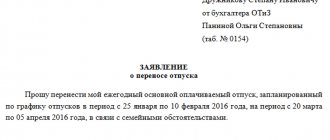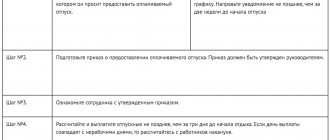In the activities of organizations, the main role is played by employees, whose work activities are regulated by labor legislation. An important role in work is played by rest time, which is necessary to replenish a person’s strength. Therefore, many questions arise regarding the provision of vacations. Sometimes an employee is motivated by personal irreplaceability, and in any organization there are people who do not go on vacation for a long time. It is believed that this is their right, but the employer’s obligation to provide vacation is regulated by law, so failure to provide vacation time to employees for the employer is fraught with administrative liability.
Let's consider what consequences await the employer if he does not provide leave to the employee.
Grounds for granting leave
The vacation schedule drawn up at each enterprise is the basis for granting vacation to an employee. Annual leave while maintaining the average salary and workplace should be 28 days per year (according to the Labor Code of the Russian Federation), while additional leave may be granted depending on the type of activity, regulated by the Labor Code of the Russian Federation and local acts of the organization.
The vacation schedule in the form developed by Goskomstat may not be used by commercial organizations from 01/01/2013, but must be and approved 1 month before the start of the year. The organization can take its own form at the local level. The vacation schedule regulates the procedure for providing employees with rest time for the purpose of avoiding vacation overlaps. All employees and their time on vacation must be reflected.
The main requirements for going on vacation are:
- submitting a leave application from the employee no later than 2 weeks in advance
- payment of vacation amounts 3 days before the start of vacation
What to do if an employee does not want to go on vacation
There are often situations when the employee himself does not want to rest and refuses to go on vacation. As we have already found out, such hard work is fraught with fines for the company. What should I do?
First, make sure that you have a vacation schedule and that the stubborn person is familiar with it. The schedule is mandatory not only for the employer, but also for all employees. And if a worker refuses to go on vacation in accordance with the schedule, this is a violation of labor discipline, punishable in accordance with local regulations and legislation of the Russian Federation (Article 192 of the Labor Code of the Russian Federation). The employer has the right to give the employee at least a reprimand.
But in which case a violator can be fired, read the material “Labor Discipline and Responsibility for Its Violation.”
An employee’s unauthorized departure from work during the period of leave must be recorded in order to eliminate future disputes about payment. This can be done by a human resources employee or an accountant. In order to stop all discussions, you can completely order the company’s security service or the employee’s immediate supervisor not to allow the worker to enter the workplace during vacation days.
ATTENTION! You can send an employee on vacation only with his consent - this is the fact of familiarization with a receipt with the vacation schedule or the manager’s order to send the employee on vacation.
Some employers, trying to get out of a situation where an employee wants to continue working without violating the Labor Code, arrange a vacation period for weekends. That is, the employee divides his annual paid leave into several parts, one of which, by law, cannot be less than 14 days (Article 125 of the Labor Code of the Russian Federation), and he takes the remaining parts on weekends.
For example, if an employee works a 5-day shift, then the accountant issues him 2 days of vacation every week - on Saturday and Sunday, until the employee uses all the allotted vacation days. In this way, the employee will exercise the right to leave and will work at the same pace.
The Labor Code of the Russian Federation does not directly prohibit such a scheme. However, inspectors may still consider this practice a violation of the law: weekends and annual paid leave are different types of rest time (Articles 106, 107 of the Labor Code of the Russian Federation). By issuing a day off, even at the request of the employee, the employer reduces the number of days of rest for the subordinate, which leads to an actual increase in working hours and infringement of the employee’s rights (paragraph 6, 12 of Article 21 of the Labor Code of the Russian Federation). The Ministry of Labor draws attention to this, in particular. Therefore, we recommend that you practice this method of providing vacation: give the employee vacation days on weekends, taking 2 adjacent days - Friday and Monday (with a five-day work week).
The employee may ask you to replace the vacation period with a cash payment. This is also prohibited by law - compensation in lieu of vacation is allowed only for days over 28 calendar days of the annual vacation period. An employee can receive money instead of vacation only upon dismissal - in the form of compensation for unused vacation (Article 127 of the Labor Code of the Russian Federation).
Time and terms of vacation
An employee has the right to be granted leave in parts, but one of the leaves must be at least 14 days, regardless of the duration of the leave (the minimum leave is 28 days and days of additional leave are added to it in accordance with the law).
But there are situations when an employee did not write a leave application in a timely manner (which should be monitored by the HR department), recall from leave due to production needs, employee illness, etc. In this regard, the employer is obliged to provide other days for rest. If vacation was not completed during the calendar year, then these days must be transferred to the next year, that is, the vacation of the next year is increased. The vacation schedule for the next year is drawn up taking these days into account.
Art. 124 of the Labor Code of the Russian Federation prohibits not providing vacation for 2 years in a row, which means that the employee must have vacation. Replacing the main vacation with a cash payment is prohibited, but in accordance with Art. 126 of the Labor Code of the Russian Federation, such compensation can be replaced by additional compensation - at the request of the employee (with the exception of minors, pregnant workers and those working in harmful (dangerous) working conditions).
In what cases can an employee go on vacation be postponed?
Annual leave can be extended (or postponed by agreement between the employer and employee) in the following situations:
- the worker is sick;
- the worker performs state duties - if they require release from the main job;
- the employer forgot to notify the subordinate 2 weeks in advance about the upcoming start of the vacation;
- the employer did not pay vacation pay on time (3 working days);
- in other situations provided for by federal legislation and local regulations (Article 136 of the Labor Code of the Russian Federation).
For more information about shifting vacation days due to illness, read the publication “How to arrange a transfer of vacation due to sick leave.”
If an employee’s going on vacation negatively affects the organization’s business activities, then it is permissible to transfer the vacation period to the next working year.
Can a director not allow you to go on vacation as scheduled due to production needs and other vacation issues - on our forum.
The transfer of vacation leave at the request of the employee is documented based on the employee’s application and the order of the manager. If the change in vacation dates is due to production needs, then the personnel service or accounting department must have the employee’s written consent to the change. For the convenience of both parties to the labor relationship and to minimize disputes, do not forget to indicate the new period of the employee’s vacation in the manager’s order to postpone the vacation.
An employee must be allowed to go on vacation no later than 12 months after the end of the working year for which he is entitled to go on vacation (Article 124 of the Labor Code of the Russian Federation). Transferring vacation is an exceptional measure and should not be practiced constantly; the employer may receive a fine for shifting vacation from year to year.
Responsibility for failure to provide leave to employees
Labor legislation prohibits failure to provide vacation for 2 years in a row and the remaining vacation for previous periods. Therefore, regardless of the reasons, the employer may be held administratively liable on the basis of Article 5.27 of the Labor Code of the Russian Federation.
| Type of administrative responsibility | Responsibility for: | |
| Officials | Organizations | |
| For failure to provide vacations | fine from 1000 to 5000 rubles. | fine from 30,000 to 50,000 rubles. |
| For repeated violation | – fine from 10,000 to 20,000 rubles. – disqualification from 1 year to 3 years | fine from 50,000 to 70,000 rubles. |
Due to the fact that employees accumulate vacations, and administrative penalties may be applied, it is recommended that the accumulated vacations be released.
Labor inspectors can learn about a violation during an inspection of an organization or from an employee complaint.
Deputy Director of the Department of Medical Education and Personnel Policy in Healthcare of the Ministry of Health of Russia Nina Kovyazina
How long are you allowed to go without rest?
An employee has the right to work without rest for no more than two years in a row. Otherwise, the employer faces liability for failure to provide leave for two consecutive years. For example, if a citizen works for 4 years, then the employer is obliged to let him go on vacation, pay vacation pay for this period, and if a violation is discovered, the supervisory authorities will hold the employer accountable.
IMPORTANT!
There are cases when an employee does not return from vacation. In this case, the law provides for punishment for failure to return from vacation on time; this violation is regarded as absenteeism. That is, the employer has the right to apply disciplinary punishment or even dismiss the employee (Articles 81 and 192 of the Labor Code of the Russian Federation). But, before resorting to sanctions, find out why the employee did not start work; there are different situations.
Example of providing accrued vacations
Although the employer is responsible for providing leave, some employees do not take leave. To avoid liability, the employer can use the following methods:
- termination of the employment contract (by mutual agreement) - in this case, upon dismissal, compensation is paid, and the next day the employment contract is signed again
- short-term vacations are provided, taking into account weekends - in this situation, over time, non-vacation days of vacation will be used and vacation pay will be accrued for vacations on weekends
When can you not go on vacation?
The Labor Code protects the rights of workers. Therefore, an employer can lawfully refuse leave only in rare (even exceptional) cases: for example, if an employee wants to go on vacation unscheduled. In this case, you can refuse.
If a person has a vacation planned for August, and he wants to go out of turn in June, you can rightfully not sign his application.
Also, an employer may not let an employee go if he has recently started work and has not worked for six months. The exception is minors and pregnant women: we have already said that they can rest whenever they want.
Another exception is if the employee plans to go on vacation and write a letter of resignation so as not to work the required two weeks. If you prohibit such manipulations in your employment contract or dismissal agreement, you may not sign a leave application or not fire the person immediately upon returning from it.
It happens that an employee is going to rest according to the established schedule, but you cannot allow this: someone went on sick leave, someone has already flown to sea, and there are not enough people. In this case, you can reschedule a person’s vacation, but only with his written consent. He writes consent, you issue an order and change the vacation schedule. But in such a way that other people’s vacations are not postponed: changes can only be made to the vacation schedule of people who agree with them.
Payments of vacation pay to employees
An employee's vacation is related to payments. Payments are calculated based on average annual earnings (excluding social payments). It is also necessary to take into account that an important condition for an employee to go on vacation is the payment of vacation pay 3 days before the vacation , and for the delay of vacation pay, the employer may be subject to financial liability provided for by the Labor Code of the Russian Federation and expressed in compensation (not subject to personal income tax) for each day of delay in payments . And compensation is calculated based on 1/150 of the key rate of the Central Bank, which is currently 7.25%, but if local acts provide for an increased payment, then compensation in excess of the statutory share is subject to personal income tax.
Administrative liability is also provided for late payment of vacation pay, so the employer needs to calculate all payments for the delay, if any, without waiting for State Tax Inspectorate checks.
What a manager should definitely not do
Don't apply for a part-time job
Part-time work is when a person works part-time, and this is formalized in an employment contract. For example, a full-time programmer also works as a tester. It seems that everything is logical: a person goes on leave from his main position, but can continue to do part-time work.
In fact, Article 286 of the Labor Code of the Russian Federation obliges the provision of leave simultaneously for two positions. You cannot send a person to take a break from his main occupation, but leave him some tasks for a part-time job: this is a gross violation.
Don't compensate for your entire vacation with money.
Vacation can be compensated - you don’t have to look for a replacement, the employee will receive more money. But you cannot compensate for your entire vacation with money. This is a violation even if the employee himself asks for it.
According to Article 126 of the Labor Code of the Russian Federation, a person must rest for at least 28 days. And for the remaining days he can get money. That is, if an employee’s vacation in hazardous working conditions is 45 days, he rests for 28 days, and receives money for 17 days.
Prohibit working on vacation
Some employers do this: they allow people to work on vacation, and when a person leaves it, they pay a bonus in the amount of their salary. It seems that everything is logical - the bonus can be paid for past merits.
Absolutely not. Essentially, a bonus is a reward for doing a good job, one of the ways to motivate employees. What do you reward for if the employee was on vacation? The presence of a bonus will raise questions from the labor inspectorate, and it may bring you to administrative responsibility.
The law obliges workers to take vacation every year, whether they want it or not. If employees do not want to rest, you can find a way out of the situation: conclude a GPC agreement with them, fire them, and then hire them, work with them as individual entrepreneurs or self-employed. What to choose depends on the working conditions and the desires of the employee himself - discuss the situation with him and together find a solution that suits both.
Calculation of vacation amounts and reflection in accounting
The procedure for calculating vacation pay is regulated by Art. 139 of the Labor Code of the Russian Federation and the Regulations on average wages, which determines:
- the amount of payments to the employee for the year preceding the vacation
- number of calendar days to calculate average daily earnings
- Average daily earnings and vacation pay
Important! The amount of vacation pay is calculated within the framework of the employment relationship and is subject to personal income tax (minus standard tax deductions) and insurance contributions.
At the same time, the employer, at its discretion, can create a reserve fund for vacation amounts or not.
If there is a vacation pay fund, then vacation pay is reflected: D 96 K 70
If there is no fund, then: D 20 (23, 26, 44, etc.) K 70
Personal income tax on vacation pay: D 70 K 68
| ★ Best-selling book “Calculating sick leave and insurance premiums in 2018” for dummies (understand how to calculate insurance premiums in 72 hours) 3000+ books purchased |
Salary documents
Documents related to wages will also be of extreme interest to inspectors.
Among other things, the State Tax Inspectorate will look at payroll and pay slips, ask for certificates of various payments, and may also ask for a certificate of salary arrears. An important point is salary indexation. Firstly, it must be in accordance with the law, secondly, it should not be confused with a salary increase, and thirdly, it is better to carry out the first two procedures several days apart.
Otherwise, inspectors may suspect you of having conducted it with violations. Taking this into account, we recommend developing a separate local regulatory act (LNA) regulating indexing.
Where are mistakes often made? Indexation should be carried out in relation to absolutely all employees of the company and its level should be the same for everyone. If in the LNA its level is indicated at 3% per year, you are obliged to index your income by this percentage. But the frequency of its implementation is not indicated anywhere, so you have the right to choose the frequency of indexing: once a year or, say, once every 2 years.
Answers to common questions
Question No. 1 : The employee wrote an application for early exit from maternity leave for up to three years and from the date of exit - an application for leave that was not previously used. Can an employer issue such leave?
Answer : Parental leave can be used at the employee’s discretion (Part 2 of Article 256 of the Labor Code of the Russian Federation), that is, he can go to work and go on parental leave at any time. When returning from maternity leave, the employer, at the request of the employee, is obliged to provide another leave.
Question No. 2 : Should an employer provide a part-time employee who is on maternity leave with up to 1.5 years?
Answer : An employee does not have the right to be on two vacations at the same time and receive two amounts of vacation pay. Therefore, in order to use the main leave, you need to receive an application for leave from parental leave and an application for the main leave, and after the main leave you can again write an application for leave to care for a child up to 1.5 years. In this case, child care benefits will not be paid, but only vacation pay will be received.
Why is a vacation schedule necessary?
The vacation schedule is one of the most important documents in personnel records management, allowing qualitative regulation of employee vacation periods taking into account the needs and capabilities of the organization, while complying with the norms of labor legislation regarding the right of employees to annual rest.
There must be a vacation schedule where there is a team. The legal form in this case does not matter. This can be a legal entity (organization) or an individual (individual entrepreneur).
The vacation schedule is a unified form No. T-7, approved by Decree of the State Statistics Committee of the Russian Federation of January 5, 2004 No. 1, but in reality the organization has the right to independently decide to fill out the specified form No. T-7 or develop its own document form adapted for a specific organization .
What threatens an employer who breaks the law?
For violating the legislation on vacations, the employer faces administrative punishment. There is no separate article in the Code of Administrative Offenses of the Russian Federation for this case, therefore penalties are imposed for violation of labor legislation in accordance with Article 5.27, parts 1 (in case of initial detection of a violation) and 2 (in case of repeated violation).
According to them, the following monetary fines are imposed on the employer:
- For the responsible (official) person within the limits of 1000 - 5000 rubles for a primary violation, and 10,000 - 20,000 rubles for a repeated violation. In especially serious cases, if a repeated violation occurs, an official may be disqualified for 1-3 years.
- Individual entrepreneurs will pay 1,000–5,000 rubles for the first violation and 10,000–20,000 rubles for the second violation. Disqualification cannot be applied to them.
- The company will pay 30,000 - 50,000 rubles for the first violation and 50,000 - 70,000 rubles for the second and subsequent ones.
Note! If the inspection reveals several cases of non-provision of leave, then the inspectors can classify this as several violations and issue an order for each of them. But there is judicial practice that cancels such decisions and qualifies identical violations in relation to several employees as one (as an example, we can cite the Ruling of the Court of the Yamalo-Nenets Autonomous Okrug dated 03.03.2016 No. 4A-305/2015).
The employer's liability for failure to provide leave occurs when he denies the employee rest during the period specified in the vacation schedule, or during any period if the employee belongs to a category that is entitled to this in other cases.
The punishment for this is determined by Article 5.27 of the Code of Administrative Offenses of the Russian Federation. You can find more complete information on the topic in ConsultantPlus. Free trial access to the system for 2 days.
Vacation system
The company's vacation system poses major risks that must be eliminated in a timely manner.
GIT always checks the vacation schedule, analyzing whether it is being accurately followed. The very absence of such a schedule is fraught with a fine of 50 thousand rubles, but failure to provide leave threatens the same fine for each case (i.e. for each employee). Usually, employees themselves do not go or do not use all their vacation, this is understandable: it is beneficial for them to accumulate days in anticipation of subsequent compensation, and long vacations allow many to get enough rest. But the company pays the fines for this out of its own pocket. In addition, an even more serious danger has arisen due to unused vacations. Based on the results of one of our client’s inspections, the State Tax Inspectorate proposed a new “interpretation” of the violation. The inspectors saw in it signs of Art. 127.2 of the Criminal Code of the Russian Federation, which by the way is “Use of slave labor.” The order was capped by the phrase: “Inspection materials must be sent to the Main Investigative Directorate of the Investigative Committee of the Russian Federation for Moscow.” Possible punishment for this is up to imprisonment for a term of 3 to 10 years.



